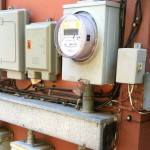As Renewables Grow in Texas, Battles Over Fees and Subsidies Emerge

Mose Buchele/StateImpact Texas
Wind turbines in West Texas help produce record amounts of electricity for the state.
In the coming years, the federal government wants Texas to reduce its carbon emissions by about 40 percent. With a goal like that, you might expect to see more programs aimed at promoting renewable energy in Texas. But something like the opposite appears to be happening.
Donna Nelson, chair of Texas’ Public Utility Commission, asked last month if wind power generators, not Texas utility customers, should pay for upgrades to transmission lines. The Commission regulates the state’s electric grid, among other things.
“This is really my attempt to flesh out some of the issues that are associated with the continued growth of renewable resources in Texas,” Nelson said. In a memo outlining her request, Nelson said wind and solar are already mature industries in Texas, and that federal subsidies distort the market. The federal tax credit for wind power was allowed to expire last year, but could be renewed by Congress this year.
Nelson’s idea got a lot of people talking. Texas’ much-touted Competitive Renewable Energy Zone (CREZ) transmission line project, that brings wind power from the West, were paid for by electric customers to encourage renewables. Those lines, along with federal subsidies, brought a boom in Texas wind power.
A boom, critics say, that Nelson of the PUC is trying to hinder by exploring the idea of a fee or tax.
“Wind is working so well that it is now pushing some of the more traditional sources of generation off the grid,” says Tom “Smitty” Smith, heads the environmental watchdog group Public Citizen in Texas.
“And as a result, the big coal companies and others are starting to fight back to tax the transmission system for wind and for solar to try and make them less popular,” Smith said.
Smith sees a political component to Nelson’s proposal. He points out that conservative policy groups are lobbying for higher fees on renewables all across the country while Democrats and President Obama encourage green energy.
But not all proposals to raise fees on renewables are coming from politicians. Some are coming from utilities that pride themselves on being green. For example, CPS, San Antonio’s city-owned electric recently proposed a fee on residential rooftop solar.
“We are very much pro-solar,” says Cris Eugster, Chief Generation & Strategy Officer with CPS. “We have the most solar deployed in the state of Texas, over a hundred megawatts, [and] roughly about a fifth of that is rooftop solar. We’ve had a very strong rebate incentive over the last four or five years that has driven that growth.”
So why charge fees for panels on San Antonians roofs? CPS is worried about their bottom line. That’s because some utilities actually pay customers with solar systems for extra power they generate but don’t use.
“If someone zeros out their bill with rooftop solar, and they’re still connected to the grid to get power in the evening or when it’s cloudy, they’ve zeroed out their bill,” Eugster says. “The way rates have been structured in the past ,we really don’t recover that cost.”
It’s not that rooftop solar makes up a huge part of the power mix now, but it’s growing at a rapid rate. And with a new federal mandate to reduce emissions, it will likely grow even more. That could explain a the increase in proposals to put fees on renewables.
“The reason to do [the fee] now is because it’s about to grow a lot,” says Michael Webber, co-director of the Clean Energy Incubator at the University of Texas at Austin. “And you want to get the fee before it grows, not after it grows.”
In her memo asking the Public Utility Commission to look into the issue, Nelson of the PUC says that as more wind power has come onto the Texas grid, it’s created more instability. System upgrades are needed to address that issue, and she wants to examine having the wind power generators pick up part of the tab. “Should we ask electric customers to fund further investment in the transmission system to improve stability or should some of the risk be borne by generators?” Nelson wrote.
Webber disagrees with fees on wind and solar. But, he says, in a strange way, the debate is good news for renewable energy advocates. After all, it shows that wind and solar are penetrating the market, forcing everyone from city utilities to state regulators to take notice.
You can likely expect some of the same legislation proposing fees or reducing incentives for renewables that has popped up in other Republican-controlled states like Kansas and Oklahoma to make their way to Texas when the state legislature convenes their next session in January.
